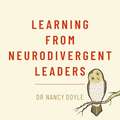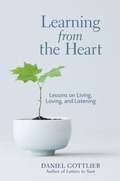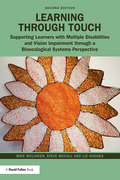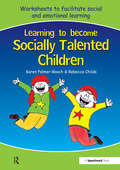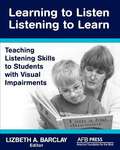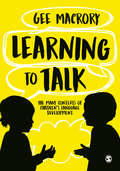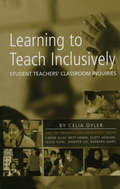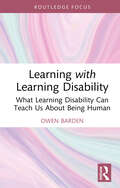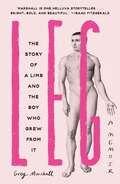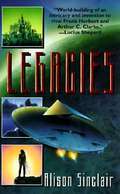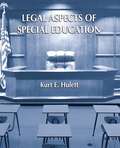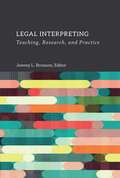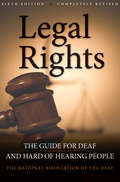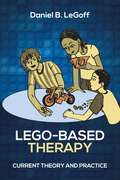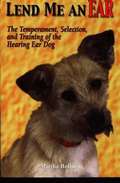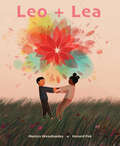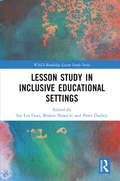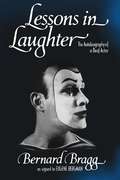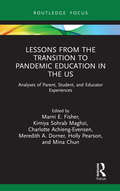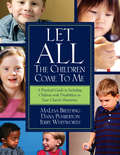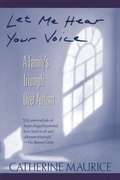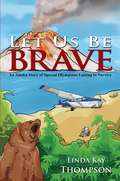- Table View
- List View
Learning from Neurodivergent Leaders: How to Start, Survive and Thrive in Leadership
by Dr Nancy DoyleNeurodivergent people are often thwarted in academic and corporate careers because we don't know the unwritten social codes of large organisations, even though we excel at strategic thinking.Practical, inspiring and no-nonsense, this book is full of essential advice on the core principles of leadership - and how to capitalise on neurodivergent strengths whilst navigating common pitfalls. Whether you're already a leader - or just starting out on your leadership journey, this is your bible for self-care, self-evaluation and self-advocacy.
Learning from the Heart: Lessons on Living, Loving, and Listening
by Daniel GottliebIn the nearly 30 years since the accident that made radio personality and columnist Dan Gottlieb a quadriplegic, he developed a finely-tuned quality of awareness that most people never achieve: he became an outsider among us--"like a foreign correspondent," as he puts it. From that vantage point, he has acutely observed the way people act, think, feel, and live--in short, he studied and learned exactly what it means to be human. Here, Dan shares his insights, written with humor, honesty, a gift for storytelling, and breathtaking compassion. Learning from the Heart looks at what divides as well as unites us, including the problems of family life; difficulties confronting today's parents; challenges faced by the disabled and the aging; and issues of injustice that affect the way we understand the world and our lives. Although Dan is now speaking directly to the reader, rather than to his own family, you'll recognize the distinctive voice and format that caused an outpouring of e-mail from fans of Letters to Sam: short anecdotal chapters rich in wisdom, generously revealing and deeply personal, and resonating with universal truths.
Learning through Touch: Supporting Learners with Multiple Disabilities and Vision Impairment through a Bioecological Systems Perspective
by Mike Mclinden Steve Mccall Liz HodgesThis fully revised and updated second edition of Learning through Touch is essential reading for practitioners who support learners with multiple disabilities and vision impairment. These learners will rely on support from their learning partners throughout their education to mediate their learning experiences. The text explores the key role that touch plays in the education of these learners and provides practical advice about how to develop the skills through touch that they will need to become ‘active agents’ in their own development. The book reflects international initiatives that seek to ensure that people with disabilities have opportunities to take meaningful control within their learning and their lives. Key features include: Chapters that support curriculum access for learners with visual impairments; Reflections on up-to-date research studies and guidance for further reading throughout, allowing for a strong conceptual foundation for practice; Portfolio activities designed to help implement effective learning opportunities within your own practice. Written to assist teachers and other professionals who support children with visual impairment and additional difficulties, this text will appeal to professionals and students alike. It is an invaluable resource for anyone looking to explore the role of touch in creating effective learning experiences.
Learning to Become Socially Talented Children
by Karen Palmer-Roach Rebecca ChildsThis resource includes more than 70 worksheets to make social and emotional learning fun! This resource uses exciting graphics, games and activities to engage and stimulate children in the learning process. It deals with a wide range of issues that affect children today.
Learning to Listen/Listening to Learn
by Lizbeth A. BarclayLearning to Listen/Listening to Learn is the first comprehensive work to address the systematic development of skills in listening for and interpreting auditory information for students who are blind or visually impaired. Listening skills are a crucial but often-overlooked area of instruction for children who are visually impaired and may have multiple disabilities, essential to literacy, independent travel, and sensory and cognitive development. Chock full of practical strategies, this volume examines the development of and instruction in learning skills at different ages, from infancy through high school. It also addresses listening skills in orientation and mobility and the needs of children with multiple disabilities, hearing impairment, and learning disabilities, as well as English language learners. Appendixes provide a Listening Skills Continuum chart and a checklist to use in assessment.
Learning to Talk: The many contexts of children’s language development
by Gee MacroryThere is a pressing need for new teachers to understand the wider context of language development and to know how best to support children in learning to talk. This accessible text introduces you to the numerous contexts of language development. It helps you understand the many ways in which children acquire language skills. Importantly, it provides a breadth of learning about language not offered by other texts exploring typical language development, atypical language development and learning more than one language. The book also explores the current literature and research on language development for primary aged children, supporting trainee teachers with their academic study.
Learning to Talk: The many contexts of children’s language development
by Gee MacroryThere is a pressing need for new teachers to understand the wider context of language development and to know how best to support children in learning to talk. This accessible text introduces you to the numerous contexts of language development. It helps you understand the many ways in which children acquire language skills. Importantly, it provides a breadth of learning about language not offered by other texts exploring typical language development, atypical language development and learning more than one language. The book also explores the current literature and research on language development for primary aged children, supporting trainee teachers with their academic study.
Learning to Teach Inclusively: Student Teachers' Classroom Inquiries
by Celia OylerThis book—co-authored by a teacher educator, a diverse group of five pre-service student teachers, and their student teaching supervisor—takes a unique, illuminating look at the experience of student teaching from the perspective of student teachers. It is premised on learning to teach as an inquiry process enriched by collaborative conversations. Readers are invited into student teachers’ dilemmas and decisions as they negotiate between their public school placements and their university-based coursework. Throughout the year of student teaching, the authors document their discussions and reflections about teaching in inclusive classrooms that shed light on the complex process of learning to teach and also offer insights into issues of teaching for equity. Each of the central chapters is written by an individual student teacher and tracks a specific question over the course of two semesters. Topics include: *contrasting models of inclusion and teachers’ differing orientations toward issues of community, difference, and normalcy;*how teachers foster peer relationships;*classroom management and discipline; *heterogeneous instruction; and*school-wide culture and systems that promote or mitigate against inclusion. A new perspective on what can be learned from student teaching is provided by the student teachers’ supervisor. In the concluding chapter, the teacher educators address the connections among the student teachers’ inquiries and offer an analysis from a disability studies/disability rights perspective on how inclusion fits into a social (rather than a medical) model of disability. All of the authors of this book seek to contribute to conversations that place advocacy, inquiry, contestation, and challenge at the center of the teacher’s role. This volume is their invitation to readers to join in a larger conversation about the challenges of, and necessity for, becoming inclusive teachers. Learning to Teach Inclusively is intended for inservice and preservice courses in elementary education, inclusion, and teacher research, and for field experience seminars. It is also suitable for graduate courses in teacher research, supervision, and research in teacher education.
Learning with Learning Disability: What Learning Disability Can Teach Us About Being Human (Autocritical Disability Studies)
by Owen BardenThis book uses the concept of “learning disability” to explore what it means to be human. It argues that we need to learn with rather than from or about learning disability. This crucial distinction means being open to what learning disability can teach us about what it means to be human. This approach comes from recognising learning disability as an organising concept – a concept which radically transforms our sense of what it means to be – or not be – a person.After reflecting on the author’s relationship to learning disability, the book explores relationships and tensions between conceptualisations of learning disability and of the human. Through historical ontology, the book initially examines how the phenomenon of “learning disability” came into being. It then explores ways in which the concept of learning disability has, over the course of the 20th and 21st centuries, radically transformed our sense not only of education and learning, but also of who is or is not deemed entitled to full citizenship and the associated rights, and so who is or is not fully human. Each chapter of the book exposes tensions and contradictions apparent in the ways we tend to think about personhood and learning disability, illuminating them through a series a binary oppositions: human and not fully human; menacing and vulnerable; controlled and abandoned; capable and incapable; human and posthuman.The book concludes by drawing together these tensions and contradictions to challenge the prevailing metanarrative of disability and make the case for a more inclusive conceptualisation of what it means to be human.It will be of interest to all scholars and students of disability studies, the history of learning disability, humanism and posthumanism, and learning disability advocacy.
Left for Dead
by Jon Hovde Maureen AndersonA book written by a Vietnam Veteran describing his war experiences, the loss of his arm and leg, his struggles because of those injuries, and the aftermath of his war experiences and subsequent injuries.
Leg: The Story of a Limb and the Boy Who Grew from It
by Greg Marshall* A MOST-ANTICIPATED SUMMER READ SELECTED BY * Washington Post *Buzzfeed * Bustle * The Advocate * LitHub * Bookriot * Electric Literature * and more!*A hilarious and poignant memoir grappling with family, disability, and coming of age in two closets-as a gay man and as a man living with cerebral palsy'Leg is intimate (and I mean that in all ways), insightful, and often laugh-out-loud funny.' - SCOTT SIMON, NPR'One hell of an entertaining book.' - BUZZFEED, Most Anticipated LGBTQ+ Books of 2023'Greg Marshall is one helluva storyteller . . . bright, bold, and beauitful.' -ISAAC FITZGERALD'A strange, smutty, hilarious, beautiful, compassionate, provoking, big-hearted, sharp-tongued, original, brilliant memoir. I hated to see it end.' - ELIZABETH McCRACKENGreg Marshall's early years were pretty bizarre. Rewind the VHS tapes (this is the nineties) and you'll see a lopsided teenager limping across a high school stage, or in a wheelchair after leg surgeries, pondering why he's crushing on half of the Utah Jazz. Add to this home video footage a mom clacking away at her newspaper column between chemos, a dad with ALS, and a cast of foulmouthed siblings. Fast forward the tape and you'll find Marshall happily settled into his life as a gay man only to discover he's been living in another closet his whole life: he has cerebral palsy. Here, in the hot mess of it all, lies Greg Marshall's wellspring of wit and wisdom.Leg is an extraordinarily funny and insightful memoir from a daring new voice. Packed with outrageous stories of a singular childhood, it is also a unique examination of what it means to transform when there are parts of yourself you can't change, a moving portrait of a family in crisis, and a tale of resilience of spirit. In Marshall's deft hands, we see a story both personal and universal-of being young and wanting the world, even when the world doesn't feel like yours to want.
Legacies
by Alison SinclairFive generations ago a renegade band of star voyagers fled their home planet. Looking back, they saw a terrible sight--their world twisted, misshaped, destroyed by the incalculable blast of their untried star drive, fired too close to home. Doomed to wander the universe, the planet killers found refuge on a dark planet circling a dim star. Now it's time for the Returning--time to enter the hole they ripped in creation and find the world they lost.
Legal Aspects Of Special Education
by Kurt E. HulettFor every course in Special Education Law and Education Law, or as a perfect supplement to any Educational Administration course, Legal Aspects of Special Education was written by a practitioner to help teachers, administrators, and advocates understand special education law in everyday language- without excessive legalese or extraneous case law. Different in many ways from other special education law texts on the market, all of the elements of this text are intended to help its students obtain the most critical information about special education law and how it is applied in the real world. Some unique features include: a fascinating opening interview and then epilogue with Joe Ballard, a pioneer of the IDEA movement; a discussion of Response-to-Intervention (RTI) and the implication of IDEA 2004 for school districts; and a discussion of the history of special education and its link to the Civil Rights Movement. Additionally, the book provides case studies and application questions, critical thinking questions, the most current information on the laws including No Child Left Behind and the Individuals with Disabilities Education Act of 2004, and a discussion of major trends changing the laws, including that of autism.
Legal Interpreting: Teaching, Research, and Practice (The Interpreter Education Series #12)
by Jeremy L. BrunsonLinguistic minorities are often severely disadvantaged in legal events, with consequences that could impact one’s very liberty. Training for interpreters to provide full access in legal settings is paramount. In this volume, Jeremy L. Brunson has gathered deaf and hearing scholars and practitioners from both signed and spoken language interpreting communities in the United States, Canada, and the United Kingdom. Their contributions include research-driven, experience-driven, and theoretical discussions on how to teach and assess legal interpreting. The topics covered include teaming in a courtroom, introducing students to legal interpreting, being an expert witness, discourses used by deaf lawyers, designing assessment tools for legal settings, and working with deaf jurors. In addition, this volume interrogates the various ways power, privilege, and oppression appear in legal interpreting. Each chapter features discussion questions and prompts that interpreter educators can use in the classroom. While intended as a foundational text for use in courses, this body of work also provides insight into the current state of the legal interpreting field and will be a valuable resource for scholars, practitioners, and consumers.
Legal Rights, 6th Ed.: The Guide for Deaf and Hard of Hearing People
by National Association of the DeafThe standard handbook on law affecting deaf and hard of hearing people has been completely rewritten and updated. The sixth edition of Legal Rights: The Guide for Deaf and Hard of Hearing People meticulously describes those statutes that prohibit discrimination against deaf and hard of hearing people, and any others with physical challenges. Written in easy-to-understand language, the new edition describes the core legislation and laws and their critical importance since their inception: The Rehabilitation Act of 1973, the Individuals with Disabilities Education Act (IDEA), and the Americans with Disabilities Act (ADA). The new Legal Rights also explains the significant amendments to these laws, including the ADA Amendments Act (ADAAA) and new regulations to its Title II concerning public entities and Title III pertaining to public accommodations and commercial facilities. The reauthorization of IDEA expanded the No Child Left Behind Act requirement for highly qualified teachers to all students with disabilities. This new edition also tracks the trend of passing a Deaf and Hard of Hearing Children's Bill of Rights in a growing number of state legislatures. This completely new resource also delineates new legislation such as the Twenty-First Century Communications Video and Accessibility Act, which ensures access to the newest communications technology for deaf and hard of hearing people. Legal Rights also includes information on the use of interpreters in the legal system, securing its position as the most comprehensive reference of legal information for deaf and hard of hearing people now available.
Lego-Based Therapy: Current Theory and Practice
by Daniel B. LeGoffThis book provides a description of the current theory and methodology of LEGO-based therapy (LBT) for social development. It is intended for all readers who have an interest in LBT and both how and why it works to improve the development of social commun
Lend Me An Ear
by Martha HoffmanLend Me an ear is a remarkable book that helps one to evaluate the temperament of dogs- specifically shelter castaways for the purpose of training as hearing dogs. The book delves into temperaments that work and do not work along with providing instruction on how to train various skills needed for the dog to alert its partner.
Leo + Lea
by Monica WesolowskaOne <P> boy <P> loves numbers. <P> Everywhere he looks <P> he sees things to count. <P> His classmates don’t understand counting as he does. <P> A new girl loves patterns. <P> Could she be <P> a friend <P> for <P> Leo? <P><P> This beautiful friendship story, inspired by the Fibonacci sequence and cleverly constructed using its mathematical pattern, celebrates our differences, as well as how math connects us to one another. <P><P> Young readers will love counting the number of words per page and discovering how they echo the Fibonacci Sequence, a mathematical series in which each number is the sum of the previous two: 0, 1, 1, 2, 3, 5, 8, 13, 21, and so on to infinity! Text and art are masterfully conceived and constructed to reflect Leo’s love of numbers. Even the color scheme in the striking illustrations follows a mathematical progression, bringing an underlying order and tranquility to the story. The mesmerizing symmetry of this fascinating and compulsively playable game of addition can also be found in the natural world and is an intriguing metaphor for the interconnectedness of all things.
Lesson Study in Inclusive Educational Settings (WALS-Routledge Lesson Study Series)
by Sui Lin GoeiLesson Study has been shown to be a systematic way of building teachers’ knowledge by allowing them to share their knowledge with each other. While much has been written about the benefits of Lesson Study in science and mathematics education, this book analyses its impact on education for children with special needs. It studies the ways in which the Lesson Study process is implemented in different educational contexts in the Netherlands, Singapore, the UK, and Sweden—countries which propagate more inclusive learning environments regardless of varying degrees of student capacities. In addition to making transcultural comparisons regarding concepts, procedures, and instruments in the use of Lesson Study in these four countries, this book will provide practice-based suggestions for teachers to formulate collaborative lesson plans.
Lessons In Laughter: The Autobiography Of A Deaf Actor
by Bernard Bragg Eugene BergmanTo succeed as an actor is a rare feat. To succeed as a deaf actor is nothing short of amazing. Lessons in Laughter is the story of Bernard Bragg and his astonishing lifelong achievements in the performing arts. <p><p> Born deaf of deaf parents, Bernard Bragg has won international renown as an actor, director, playwright, and lecturer. Lessons in Laughter recounts in stories that are humorous, painful, touching, and outrageous, the growth of his dream of using the beauty of sign language to act. He starred in his own television show "The Quiet Man," helped found The National Theatre of the Deaf, and traveled worldwide to teach his acting methods.
Lessons from the Transition to Pandemic Education in the US: Analyses of Parent, Student, and Educator Experiences (Routledge Research in Education)
by Marni E. Fisher; Kimiya Sohrab Maghzi; Charlotte Achieng-Evensen; Meredith A. Dorner; Holly Pearson; Mina ChunThis volume narrates and shares the often-unheard voices of students, parents, and educators during the COVID-19 pandemic. Through close analysis of their lived experiences, the book identifies key patterns, pitfalls, and lessons learnt from pandemic education. Drawing on contributions from all levels of the US education system, the book situates these myriad voices and perspectives within a prismatic theory framework in order to recognise how these views and experiences interconnect. Detailed narrative and phenomenological analysis also call attention to patterns of inequality, reduced social and emotional well-being, pressures on parents, and the role of communication, flexibility, and teacher-led innovation. Chapters are interchanged with interludes that showcase a lyrical and authentic approach to understanding the multiplicity of experience in the text. Providing a valuable contribution to the contemporary field of pandemic education research, this volume will be of interest to researchers, academics, and educators with an interest in the sociology of education, online teaching and eLearning, and those involved with the digitalization of education at all levels. Those more broadly interested in educational research methods and the effects of home-schooling will also benefit.
Let All the Little Children Come to Me
by Dana Hood Malesa Breeding Jerry E. WhitworthIt is said that everyone has a story to tell, a voice that deserves to be heard. There are many thousands of children with special needs who have long been ignored, rejected and excluded from our schools, our communities, and, sadly, from our Bible classes. We believe that these children are loved deeply and completely by our Lord and that they too are called to come unto Him. This book speaks to the heart and to the head. Teachers and pastors will find inspiration and information, reminding them that God calls us to include all children, no matter the challenge. In addition, the book includes wonderfully practical elements with many ideas that can be easily integrated into any classroom. By combining philosophy and strategies, this book will equip the typical church volunteer teacher to meet the needs of all the children in her classroom.
Let Freedom Ring: Braille Letters to President Barack Obama
by National Federation of the BlindA collection of letters to President Obama about the experience of using braille.
Let Me Hear Your Voice: A Family's Triumph Over Autism
by Catherine MauriceShe was a beautiful doe-like child, with an intense, graceful fragility. In her first year, she picked up words, smiled and laughed, and learned to walk. But then Anne-Marie began to turn inward. And when her little girl lost some of the words she had acquired, cried inconsolably, and showed no interest in anyone around her, Catherine Maurice took her to doctors who gave her a devastating diagnosis: autism. In their desperate struggle to save their daughter, the Maurices plunged into a medical nightmare of false hopes, "miracle cures," and infuriating suggestions that Anne-Marie's autism was somehow their fault. Finally, Anne-Marie was saved by an intensive behavioral therapy. Let Me Hear Your Voice is a mother's illuminating account of how one family triumphed over autism. It is an absolutely unforgettable book, as beautifully written as it is informative. "A vivid and uplifting story ... Offers new strength to parents who refuse to give up on their autistic children." -- Kirkus Reviews. "Outstanding ... Heartfelt ... A lifeline to families in similar circumstances." -- Library Journal.
Let Us Be Brave: An Alaska Story of Special Olympians Uniting to Survive
by Linda ThompsonA dramatic bush plane crash in coastal Alaska leaves the pilot injured. The passengers, a team of Special Olympic Athletes, must fend for themselves to survive. An Alaska storm first threatens to overwhelm them during the night as they care for their unconscious pilot. Each must confront the challenges of survival in the wilderness, while transcending their limitations. Forced to overcome their habits of dependency and help each other, the group finds courage in the Olympic oath: "Let me win, but if I cannot win, let me be brave in the attempt."
